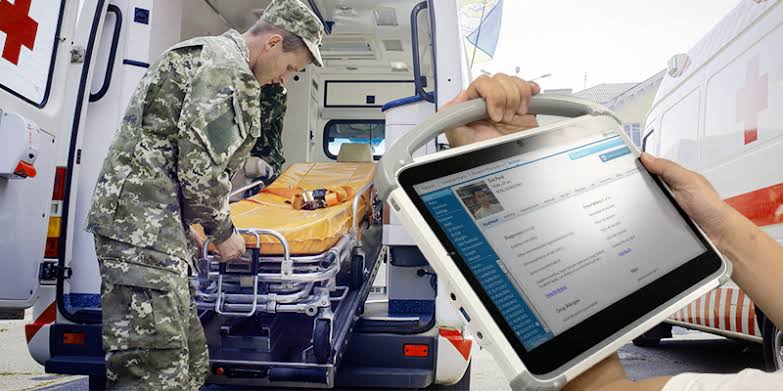The Role of Tablets in Enhancing Healthcare and Telemedicine
Explore how tablets are transforming healthcare and telemedicine. Discover their role in improving patient care, enhancing clinical efficiency, supporting remote monitoring, and facilitating medical education. Learn about the benefits, challenges, and future trends of using tablets in the healthcare sector.
Tablets | August 23, 2024
Explore how tablets are transforming healthcare and telemedicine. Discover their role in improving patient care, enhancing clinical efficiency, supporting remote monitoring, and facilitating medical education. Learn about the benefits, challenges, and future trends of using tablets in the healthcare sector.
Tablets play a role, in improving healthcare and telemedicine by transforming how doctors connect with patients and handle health data. Their convenience, adaptability and features make them suitable for use in the medical field. This article delves into the ways tablets are boosting telemedicine showcasing their advantages, obstacles and future possibilities.
Improving Patient Care and Accessibility
Tablets in the field offer significant advantages, in enhancing patient care and improving accessibility. They equip professionals with access to records, medical resources and diagnostic tools enabling informed decision making. This level of accessibility is vital for doctors, nurses and other healthcare providers who rely on information for accurate diagnoses and treatment planning. Moreover tablets promote communication between healthcare providers and patients. Through telemedicine applications doctors can hold consultations allowing patients to receive medical guidance from their homes. This feature proves especially valuable for individuals residing in areas with limited access to healthcare facilities.
Enhancing Clinical Efficiency and Workflow
Tablets play a role, in improving efficiency and simplifying processes in the field of healthcare. Healthcare professionals can swiftly and accurately update patient information through electronic health record (EHR) systems accessed on tablets. This documentation minimizes errors and ensures that all team members have access, to the patient data. Moreover tablets serve purposes such as managing schedules, tracking patient progress and coordinating care among various providers. By consolidating tasks and reducing reliance on paperwork tablets contribute to enhanced overall efficiency, in medical environments. Supporting Remote Monitoring and Telemedicine. The use of tablets in telemedicine has broadened the scope for monitoring and virtual healthcare services. Equipped with sensors and connectivity options tablets can monitor patient vital signs like blood pressure, heart rate and glucose levels remotely. This functionality enables monitoring of conditions and prompt intervention when needed.
Telemedicine platforms available on tablets allow for consultations follow up visits and referrals to specialists. This not only minimizes the necessity for face to face appointments but also offers patients a healthcare experience that is more convenient and accessible. For instance individuals with mobility challenges or those residing in areas can receive medical attention without having to journey over distances.
Facilitating Medical Education and Training
Tablets are revolutionizing how medical education and training are conducted. Students and healthcare professionals utilize tablets to access materials such as textbooks, research articles and interactive simulations. These resources enrich the learning experience by delivering information and practical, hands on training in a format.
Additionally tablets support the integration of reality (AR) and reality (VR) applications in training. These technologies facilitate simulations of medical procedures and anatomical structures providing insights into intricate concepts and methods. This style of learning proves valuable, for practical training and honing skills.
Addressing Privacy and Security Concerns
Although tablets provide advantages in healthcare their usage also brings up significant privacy and security issues. Safeguarding patient data calls, for security protocols to thwart access and data breaches. It is crucial for healthcare professionals to ensure that tablets come equipped with encryption, secure authentication methods and adherence to regulations like the Health Insurance Portability and Accountability Act (HIPAA) in the United States.
To tackle these challenges healthcare institutions should establish security measures and frequently update software to guard against weaknesses. Educating personnel about practices regarding data security and privacy is vital for protecting patient information.
Future Trends and Innovations
Looking into the future the role of tablets in healthcare and telemedicine is anticipated to evolve with the progress of technology. Upcoming trends may involve incorporating intelligence (AI) for assistance advanced imaging features and improved remote monitoring tools. Tablets could play a role in personalized medicine by providing customized treatment plans based on data analysis. Moreover the creation of user friendly interfaces will enhance the experience for both healthcare professionals and patients. Advancements in connectivity like 5G technology could further enhance the capabilities of tablets in telemedicine allowing remote interactions.
Conclusion
Tablets have made an impact, on healthcare and telemedicine providing a variety of advantages such as better patient treatment improved operational effectiveness in clinics enriched medical training and remote patient monitoring. With advancements in technology tablets are poised to play a role, in reshaping how healthcare is delivered and broadening the reach of services. By tackling issues related to privacy and security and keeping up with developments healthcare institutions can fully leverage the capabilities of tablets to improve patient outcomes and optimize medical procedures.
